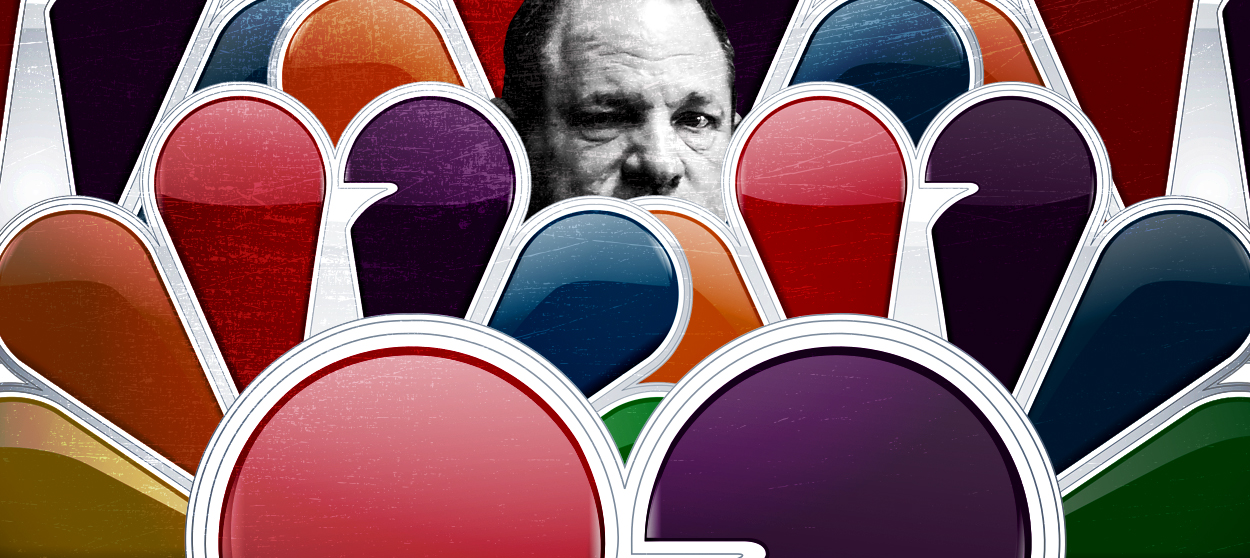When the media protects the powerful
Ronan Farrow's bombshell new book illustrates an insidious trend among the nation's news networks


A free daily email with the biggest news stories of the day – and the best features from TheWeek.com
You are now subscribed
Your newsletter sign-up was successful
In his new book Catch and Kill, Ronan Farrow claims that NBC News obstructed and ultimately killed his investigation of Harvey Weinstein's history of sexual assaults. He alleges that company executives, particularly NBC News president Noah Oppenheim, prevented the Weinstein story from going to air in order to cover up former Today show host Matt Lauer's own similar crimes. As Farrow maintains, Weinstein threatened to go public with Lauer's long list of sexual assaults should NBC run anything about him. Farrow ended up taking his story to The New Yorker, which published the devastating account two months after he left his job at NBC, and the piece eventually earned the wunderkind investigative journalist a Pulitzer Prize.
NBC News executives, of course, are disputing the bombshell allegations. But Farrow's book illustrates the industry-wide problem of news organizations protecting those in power, a practice that has significant ramifications for how media outlets cover the biggest news, especially American politics. The saga serves as a reminder that networks ought to reckon more deeply with how their relationships with the powerful, whether in Hollywood, Washington, or elsewhere, affect their handling of sensitive news items and their commitment to unbiased investigative journalism, no matter where a story takes them.
Not surprisingly, other networks have dedicated steady coverage to the mounting controversy at NBC News. While it's no doubt an important story that deserves broad attention, these other networks would do well to tend their own gardens. The sort of gleeful zeal with which Fox News has covered the story, including with regular reminders to its viewers that Harvey Weinstein was a big Hillary Clinton donor, looks particularly embarrassing given the network's own extensive history of covering up numerous sexual harassments and assaults in its offices.
The Week
Escape your echo chamber. Get the facts behind the news, plus analysis from multiple perspectives.

Sign up for The Week's Free Newsletters
From our morning news briefing to a weekly Good News Newsletter, get the best of The Week delivered directly to your inbox.
From our morning news briefing to a weekly Good News Newsletter, get the best of The Week delivered directly to your inbox.
Fox News also regularly flaunts its close connection with President Trump, shamelessly coordinating its message with that of the White House. As a Trump adviser boasted to The Washington Post last year, Fox's Sean Hannity had so deeply insinuated himself into the White House that "he basically has a desk" there. It's also worth remembering that Bill Shine, the disgraced Fox News co-president responsible for covering up Roger Ailes' widespread alleged sexual misconduct, later took a job as Trump's communications chief. Aside from his communications skills, Shine's willingness to protect a powerful man from the fallout of his worst behavior likely landed him the job.
No doubt good reporting has always relied on cultivating close relationships with invaluable sources. Still, a relaxed coziness with and deference to those in power has an insidious habit of shaping reporting, distorting analysis, and affecting coverage that all news organizations must vigorously defend against.
In a brave and searing monologue on his MSNBC show earlier this week, Chris Hayes addressed just this. Noting how Republican leaders continue to kowtow to the president and avoid confronting him on his unconstitutional actions and outrageous behavior, Hayes argued that the cowardly decision to take "the path of least resistance" was "everywhere you look," including at his employer, NBC News. "But of course it's the very ease of that path that makes it the enemy of the kind of work that we as journalists are supposed to do," Hayes said.
For his part, Oppenheim has shot back at Farrow's book, and the extensive media promotion that has accompanied its publication this week, with a six-page memo distributed to all NBC News and MSNBC employees. Calling Farrow's work a "smear" and a "conspiracy theory," Oppenheim maintained the company line that the network had fired Lauer as soon as it became aware of the first complaint against him. Farrow's reporting shows instead that network honchos knew about Lauer's misconduct for years and used paid settlement agreements to silence multiple women who made complaints against the popular host well before he was axed by NBC in November 2017.
A free daily email with the biggest news stories of the day – and the best features from TheWeek.com
"We have no secrets and nothing to hide," Oppenheim wrote in his memo. That doesn't seem to be the shared view at 30 Rockefeller Plaza. As The Daily Beast's Maxwell Tani has reported, NBC staffers are questioning the network leadership's response to the controversy and worry that Farrow's story threatens the news division's credibility.
They should.
Whether in business, politics, or journalism, the path of least resistance continually presents itself, demanding the sacrifice of principles in order to accommodate the powerful. That's a destructive compromise no matter where it takes place. But for a profession devoted to truth-telling and earning the public trust, it is an especially damning concession for journalism to make.
Want more essential commentary and analysis like this delivered straight to your inbox? Sign up for The Week's "Today's best articles" newsletter here.
Neil J. Young is a historian and the author of We Gather Together: The Religious Right and the Problem of Interfaith Politics. He writes frequently on American politics, culture, and religion for publications including The New York Times, The Atlantic, the Los Angeles Times, HuffPost, Vox, and Politico. He co-hosts the history podcast Past Present.
-
 How the FCC’s ‘equal time’ rule works
How the FCC’s ‘equal time’ rule worksIn the Spotlight The law is at the heart of the Colbert-CBS conflict
-
 What is the endgame in the DHS shutdown?
What is the endgame in the DHS shutdown?Today’s Big Question Democrats want to rein in ICE’s immigration crackdown
-
 ‘Poor time management isn’t just an inconvenience’
‘Poor time management isn’t just an inconvenience’Instant Opinion Opinion, comment and editorials of the day
-
 The billionaires’ wealth tax: a catastrophe for California?
The billionaires’ wealth tax: a catastrophe for California?Talking Point Peter Thiel and Larry Page preparing to change state residency
-
 Bari Weiss’ ‘60 Minutes’ scandal is about more than one report
Bari Weiss’ ‘60 Minutes’ scandal is about more than one reportIN THE SPOTLIGHT By blocking an approved segment on a controversial prison holding US deportees in El Salvador, the editor-in-chief of CBS News has become the main story
-
 Has Zohran Mamdani shown the Democrats how to win again?
Has Zohran Mamdani shown the Democrats how to win again?Today’s Big Question New York City mayoral election touted as victory for left-wing populists but moderate centrist wins elsewhere present more complex path for Democratic Party
-
 Millions turn out for anti-Trump ‘No Kings’ rallies
Millions turn out for anti-Trump ‘No Kings’ ralliesSpeed Read An estimated 7 million people participated, 2 million more than at the first ‘No Kings’ protest in June
-
 Ghislaine Maxwell: angling for a Trump pardon
Ghislaine Maxwell: angling for a Trump pardonTalking Point Convicted sex trafficker's testimony could shed new light on president's links to Jeffrey Epstein
-
 The last words and final moments of 40 presidents
The last words and final moments of 40 presidentsThe Explainer Some are eloquent quotes worthy of the holders of the highest office in the nation, and others... aren't
-
 The JFK files: the truth at last?
The JFK files: the truth at last?In The Spotlight More than 64,000 previously classified documents relating the 1963 assassination of John F. Kennedy have been released by the Trump administration
-
 'Seriously, not literally': how should the world take Donald Trump?
'Seriously, not literally': how should the world take Donald Trump?Today's big question White House rhetoric and reality look likely to become increasingly blurred
